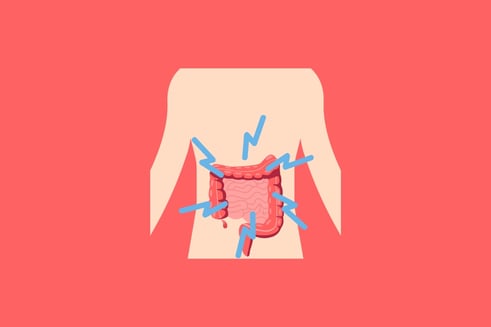Bowel Cancer: Symptoms & Treatment in NZ
Learn more about bowel cancer (colorectal, colon, or rectal cancer) symptoms, causes and risk factors, screening, staging, diagnosis, treatment & prevention.
Bowel cancer (also known as colon, rectal, or colorectal cancer) is one of the most commonly diagnosed cancers in New Zealand.
Here are some key statistics about bowel cancer:
- Cases of colorectal cancer continue to climb.
In 2010, there were 3,002 new cancer registrations and 1,208 deaths attributed to colorectal and anus cancers. In 2020, these diseases accounted for 3,404 new cancer cases in New Zealand. In the same year, 1,435 patients succumbed to the disease. - Bowel cancer affects both older adults and younger individuals.
Most bowel cancer cases (about 93%) are found in individuals over 50 years old, but over 350 cases are diagnosed in younger people each year.

Health | Life | Trauma | Total and Permanent Disability | Income Protection
Learn more on different types of insurance from an expert licenced financial adviser and see what's best for your circumstances.

Learn more about different types of insurance from a licenced financial adviser and see what's best for your circumstances.
Health | Life | Trauma | Total and Permanent Disability | Income Protection
The good news is that early diagnosis and prompt treatment give patients good odds of beating colorectal cancer. Those who get treatment at the early stages have a 90% chance of long-term recovery.
Read on to learn more about colon and rectal cancer risk factors, symptoms, screening, diagnosis and prevention. Discover common treatment options, and how health insurance can help you pay for private healthcare and non-PHARMAC funded drugs for bowel cancer.
What Is Bowel (Colorectal) Cancer?
Different terms are used to refer to bowel cancer, depending on where the cancer started. Colon cancer begins in the large intestine, while rectal cancer starts in the rectum, which is the lower part of the large bowel.
Bowel cancer develops from an abnormal growth of cells lining the colon or rectum. In many cases, these begin with noncancerous growths (polyps) on the bowel’s walls.
Over the years, these polyps may become malignant tumours that interfere with bowel function. Eventually, the cancer spreads to local lymph nodes and reaches the liver, lungs, and other parts of the body.
Colon Cancer Causes and Risk Factors
Several factors can increase a person’s risk of contracting bowel cancer. Some are genetic, while others can be modified with lifestyle changes.
Unpreventable Causes and Risk Factors
-
Age – most bowel cancer cases occur in individuals over 50 years old
-
Inflammatory bowel disease such as long-term ulcerative colitis and Crohn’s disease
-
A history of cancer, including breast and ovarian cancers, or previous instances of colon and rectal cancers
-
Significant history of bowel cancer or polyps in the family, particularly when first-degree relatives (parents, siblings or children) or second-degree relatives (grandparents, aunts and uncles, grandchildren, nieces, nephews or half-siblings) have been diagnosed with colorectal cancer
-
Genetic conditions like familial adenomatous polyposis, hereditary non-polyposis colorectal cancer (HNPCC) or Lynch syndrome, and MYH-associated polyposis (MAP)
Preventable Bowel Cancer Risk Factors
-
Cigarette smoking
-
Drinking alcohol
-
A sedentary lifestyle/lack of physical activity
-
Being overweight or obese
-
A diet high in red meat, saturated fats, processed meat, and low in fibre
Signs and Symptoms of Bowel Cancer in Men and Women
-
Blood in the stool (faeces/poo)
-
Rectal bleeding
-
Changes in bowel motions that continue for several weeks – these changes can be diarrhoea, constipation, narrow stools, mucus in stools, or feeling like you haven’t completely emptied your bowel
-
Frequent abdominal pain, bloating, or cramps
-
Anal pain or lumps around the anus
-
Unexplained weight loss
-
Fatigue
-
Anemia
If you have any of these symptoms, set up an appointment with your GP right away. The sooner you can get diagnosed and treated, the higher your chance of beating colorectal cancer..

Bowel Cancer Screening and Diagnosis in NZ
Colorectal Cancer Screening
Taking part in bowel screening every two years improves your chances of detecting cancer before symptoms appear or it spreads to other parts of the body. Addressing colorectal cancer at its earliest stages increases the possibility of successful treatment.
New Zealand offers free bowel screening to anyone aged 60 to 74 who is eligible for public healthcare. Qualifying individuals are given a kit with instructions on how to do the test at home. You can find more information about the National Bowel Screening Programme and the bowel screening tests by calling 0800 924 432.
Note that bowel screening is not recommended for individuals who:
-
have bowel cancer symptoms or other bowel problems
-
had undergone or are currently taking bowel cancer treatment
-
have active ulcerative colitis or Crohn’s disease
-
have had a colonoscopy in the past five years
-
have gone through colectomy (removal of the large bowel)
-
are under the polyp or bowel cancer surveillance programmes
Colorectal Cancer Diagnostic Tests
Several tests can be done to diagnose bowel cancer as listed below.
-
Faecal occult blood test – detecting blood in bowel motions or faeces
-
Abdominal exams – checking for lumps on the abdomen/stomach
-
Rectal exams – looking for lumps or swelling in the rectum
-
Blood count – checking for anaemia
-
Sigmoidoscopy – examining the sigmoid colon (lower large intestine) using a long tube called a sigmoidoscope, and may involve taking a biopsy (tissue sample)
-
Virtual colonoscopy (CT colonography) – taking CT scans of the abdomen to get an interior view of the colon and rectum
-
Colonoscopy – a procedure performed by colorectal surgeons or gastroenterologists checking for abnormalities in the colon and rectum, which may include removal of polyps or a biopsy
Stages of Bowel Cancer
As well as the tests above, patients may also go through several scans during bowel cancer detection and treatment. For instance, CT scans can help determine if the cancer has spread, while MRI scans help specialists plan for any surgery.
Below are the four stages of bowel cancer that a patient may experience:
-
Stage I: At this early stage, the cancer is confined within the inner layer of the colon or rectum – the odds of curing bowel cancer at Stage I are above 90%
-
Stage II: The cancer has grown and reached the outer layers of the colon or rectum and adjacent areas
-
Stage III: The cancer has reached the local lymph nodes
-
Stage IV: The cancer has spread (metastasised) and reached distant organs (such as the lungs and liver) and other lymph nodes
Bowel Cancer Treatments in NZ
The form of treatment that colorectal cancer patients receive depends on:
-
the cancer’s location in the bowel
-
the cancer’s size
-
whether or not it has spread to other parts of the body
-
the patient’s condition and decision about their health
Detecting and treating bowel cancer at its early stages increases the likelihood that it can be removed, and treatment can keep it from recurring.
If the cancer has already spread to other parts of the body, it’s possible that it can no longer be eliminated through surgery alone. Treatment will focus on managing symptoms, slowing down the spread of cancer, and improving the patient’s quality of life.
Surgery
Surgery is often the only treatment recommended for patients with Stage I or Stage II bowel cancer. The tumour and the tissue around it are tested to determine the tumour’s size and whether or not the cancer has spread to other parts of the body.
For patients with Stage III colorectal cancer (where the cancer has reached the local lymph nodes), surgery alone may not be enough. Patients may have to go through chemotherapy to ensure all the cancer cells are destroyed, and to reduce the risk of recurrence.
Chemotherapy
Chemotherapy uses drugs to get rid of cancer cells while minimising the damage to healthy cells. Chemotherapy may involve one or a combination of several drugs.
Chemotherapy may be used to:
-
reduce a large cancer’s size so it can be easily removed during surgery
-
enhance the effect of radiation treatments
-
prevent bowel cancer recurrence after surgery
For people whose cancer has spread (Stages III and IV), chemotherapy can offer the best chance of living longer and having a better quality of life.
Radiation Treatment (Radiotherapy)
Radiotherapy uses powerful x-rays to destroy cancer cells. It can be used to:
-
reduce the cancer’s size before surgery
-
lessen bowel cancer symptoms
-
provide palliative treatment when bowel cancer has already reached other organs
In some cases, radiation treatment can also be combined with chemotherapy (chemoradiation) to shrink rectal cancer prior to surgery. If the cancer has metastasised, chemoradiation can be used to reduce the cancer’s size and to manage symptoms like bleeding.
Immunotherapy Drugs (Targeted Therapy)
These treatments use the patient’s immune system to target cancer cells and can be combined with chemotherapy. They are most often used for advanced colorectal cancer. In New Zealand, immunotherapies are not yet funded by PHARMAC.
Palliative Treatment
Palliative care improves patients’ quality of life by relieving or managing the symptoms of bowel cancer and the adverse side effects of treatment.
Funding Tests and Treatment
While many colorectal cancer treatments are publicly funded in New Zealand, some, like immunotherapy, will require private funding. Immunotherapy costs can run up to $100,000.
Bowel cancer patients and their families currently pay for non-PHARMAC funded drugs out of their own pockets. Some may have to sell assets, go into debt, apply for cost-share programs or turn to crowdfunding to raise funds.
Some Kiwis are looking to private health facilities to avoid the long wait times in public facilities, where patients are reported to have waited up to 11 weeks for treatment.
Patients who opt to go private for their care and treatment are facing significant medical bills. Radiotherapy and chemotherapy costs can run up to $55,000 and $170,000, respectively.
Health insurance plans can help shield Kiwis from the crippling costs of cancer. Plans that include cancer care and non-PHARMAC funded drug cover can help pay for diagnostic tests, surgery, chemotherapy, non-funded treatments and other medical costs.
Life insurance policies can also help fund cancer treatment costs. Policyholders with critical illness trauma cover may receive a lump sum payment, which they can then use for life-extending treatments and other healthcare expenses.
Prevention: Lowering Your Risk of Colorectal Cancer
Here are some ways to lower your risk of developing colorectal cancer.
-
Quit smoking
-
Only drink alcohol in moderation
-
Get physically active and exercise regularly
-
Follow a healthy diet: eat more fish and high-fibre foods like whole grains, fruit and vegetables. Cut back on red meat, animal fats and cured or processed meat.
-
Aim for a healthy weight or a body mass index (BMI) in the healthy range.
Important Disclaimer: The information on this website is general in nature and does not consider your personal situation. It is not intended as a definitive financial guide. Before making any KiwiSaver or insurance decisions, we recommend speaking with a licensed Policywise adviser.
Policywise advisers are licensed by the Financial Markets Authority to give financial advice on KiwiSaver and health, life, and disability insurance. For more, see our Public Disclosure page.
All insurance is subject to insurer approval. Policies may include stand-down periods, exclusions, terms and conditions, and premium loadings not listed here. Optional (add-on) benefits come at an extra cost. Please refer to the relevant policy document for full and current details, as insurers may update these at any time.
Product pages on this site are summaries only. In the case of any difference between website content and the provider’s official policy wording, the provider’s wording will apply.
Quickly find the cover that’s best for you
Policywise tells you which health, life or disability insurance best matches your circumstances, 100% free. Talk to one of our insurance advisers to find out which health or life insurance is best for bowel cancer, and other serious illnesses.
References
-
“About Bowel Cancer.” Bowel Cancer New Zealand. https://bowelcancernz.org.nz/about-bowel-cancer/treatment-options/unfunded-drugs-and-clinical-trials/
- “About the National Bowel Screening Programme.” Time to Screen. https://www.timetoscreen.nz/bowel-screening/about-the-national-bowel-screening-programme/
- “Bowel Cancer.” Cancer Society of New Zealand. https://www.cancer.org.nz/assets/Downloads/Bowel-cancer/Cancer-society-information-sheet-bowel-cancer.pdf.
- “Bowel Cancer.” Cancer Society of New Zealand. https://www.cancer.org.nz/cancer/types-of-cancer/bowel-cancer/
- “Bowel Cancer.” New Zealand Ministry of Health. https://www.health.govt.nz/your-health/conditions-and-treatments/diseases-and-illnesses/bowel-cancer
- “Bowel Cancer; ate Pukupuku i te Whēkau.” Health Navigator New Zealand. https://www.healthnavigator.org.nz/health-a-z/b/bowel-cancer/
- “Bowel (Colorectal) Cancer – Symptoms, Treatment.” 2019. Southern Cross. https://www.southerncross.co.nz/group/medical-library/bowel-colorectal-cancer-symptoms-treatment
- “Bowel screening.” Time to Screen. https://www.timetoscreen.nz/bowel-screening/
- “Cancer: Historical Summary 1948–2017.” New Zealand Ministry of Health. https://www.health.govt.nz/publication/cancer-historical-summary-1948-2017
- “Doing the bowel screening test.” Time to Screen https://www.timetoscreen.nz/bowel-screening/doing-the-bowel-screening-test/
- “Health Insurance.” 2021. nib.
https://www.nib.co.nz/health-insurance - “Immunotherapy Treatment: Cost Share Programme.” Bowel Cancer Foundation Trust. https://www.bowelcancerfoundation.org.nz/immunotherapy
- “New Zealand Fact Sheets.” The Global Cancer Observatory. March, 2021. https://gco.iarc.fr/today/data/factsheets/populations/554-new-zealand-fact-sheets.pdf
- “Non-modifiable Risk Factors.” Bowel Cancer Australia.
https://www.bowelcanceraustralia.org/non-modifiable-risk-factors - “Official Information Act (1982) Request.” September 13, 2018. Counties Manukau Health. Received by Martin, H, Stuff. https://www.countiesmanukau.health.nz/assets/Official-Information-Act/0188ed017d/OIA-08082018-MARTIN-Cancer-Surgical-Wait-times.pdf
- Ryan-Harshman, M, and Aldoori, W. “Diet and colorectal cancer: Review of the evidence.” Canadian Family Physician Medecin de Famille Canadien, 53(11), 1913–1920. https://www.ncbi.nlm.nih.gov/pmc/articles/PMC2231486/
- “Screening.” Bowel Cancer New Zealand. https://bowelcancernz.org.nz/about-bowel-cancer/early-detection-and-prevention/screening/
- “Symptoms & Statistics.” Bowel Cancer New Zealand. https://bowelcancernz.org.nz/about-bowel-cancer/what-is-bowel-cancer/symptoms-statistics/
- “What Are the Risk Factors for Colorectal Cancer?.” Centers for Disease Control and Prevention. https://www.cdc.gov/colorectal-cancer/risk-factors/index.html
ON THIS PAGE
Download our insurance comparison chart
We need a few details before we can send you this content…
* All fields are required


